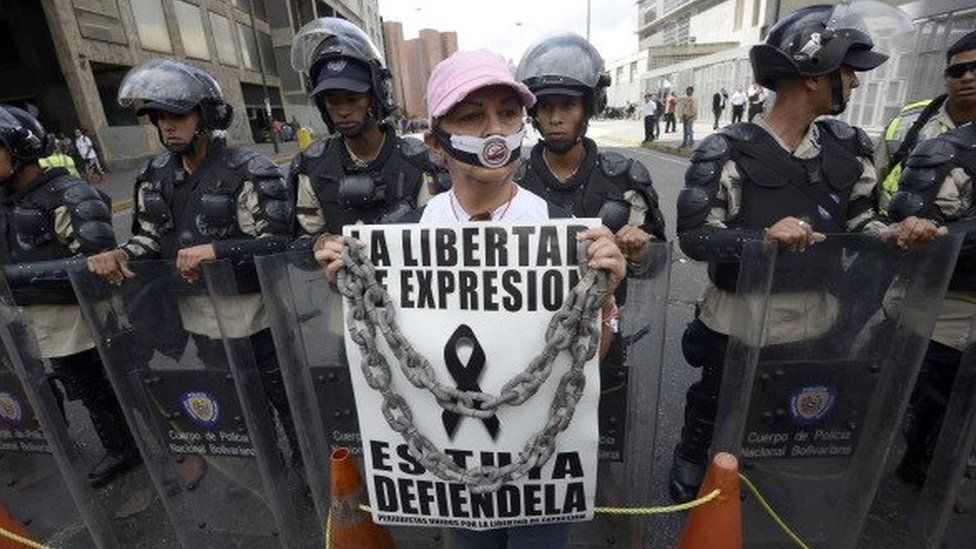Venezuela's media reflect the country's political divisions
- Published

Venezuela is a country with deep political divisions between those who support the socialist government of President Nicolas Maduro and those who fiercely oppose it.
This division is reflected in sharply polarised attitudes towards the media.
Venezuelan journalists' unions and opposition politicians accuse the authorities of clamping down on press freedom, while the government and its supporters say that they are the victims of a "media war".
Seventy percent of television and radio stations are privately-owned, but an array of defamation laws has led them to be wary about what they broadcast.
In the past 10 years, one major television channel, RCTV, and 34 radio stations have lost their broadcasting licences.
Miguel Henrique Otero, the editor of El Nacional, the only national daily newspaper that is overtly critical of the government, left the country in May 2015 after a top government official launched a lawsuit against him.
The Venezuelan press workers' union (SNTP) says the government's hostile rhetoric against the media has led to a rise in attacks on journalists.
The media landscape has changed markedly since Mr Maduro's predecessor and mentor, Hugo Chavez, was first elected 17 years ago.
Back then, the main privately-owned TV stations were very critical of his left-wing government.
To counter what government supporters perceived as right-wing propaganda against the socialist president. they founded hundreds of community radio and television stations.
Most are partially funded through government advertising, and those working there continue to believe that the mainstream media give an unfairly negative picture of President Chavez's Bolivarian revolution.
Here, four Venezuelans on different sides of the political divide give their views on the media.
Freddy Guevara, member of the National Assembly for the opposition MUD coalition
"We don't have a free press. A free press means being able to say what you want without fear of the consequences.
"The biggest independent TV station was closed by the government just because it opposed them.
"Media owners have been harassed and forced to flee the country or forced to sell shares in their companies to businessmen close to the government.
"The government has a monopoly of the paper needed to print newspapers and gives more paper to newspapers that support it.
"Meanwhile the state-owned media is subjugated to the interests of the political party in power, the Socialist Party of Venezuela. This is not a fair or balanced situation."
Karina Rivas, co-founder of the community station Colectivo Radiofonico Petare
"The big private media companies don't show reality of the country. They only follow the lines set by the owners.
"These big media companies and media trans-nationals have been instruments of suppression by imperialism against the people.
"Our aim has been to open our microphones, our cameras, our notebooks, so the people can express themselves. This doesn't happen in the rest of the media.
"We believe in the Bolivarian revolution and we are activists in the revolution, but we try to communicate with everyone.
"When we see the government do bad things, we criticise it, of course."
Marco Ruiz, general-secretary of the Venezuelan press workers' union
"The ability to exercise freely rights such as freedom of expression and access to information has become more and more difficult in this country.
"The former president Hugo Chavez used rhetoric to criminalise the work of the media. That was echoed by governors, mayors and the current president Nicolas Maduro.
"This discourse was interpreted by the government's followers to mean that journalists were the enemy of the nation.
Concepcion Alzuro, co-director of the community station Radio Libre Negro Primero
"The mainstream media are very manipulative, on a national and international level - especially the international media.
"We are the ones who live here, who know what's happening here. They use television, radio and newspapers to entertain while trying to find a way to destroy our politics, destroy the revolution, destroy us.
"I am a builder. Who would have thought that at the age of 50-something I would be sitting behind a microphone.
"I've become a communicator, even though I don't have any qualifications from a university.
"As revolutionaries we do criticise the government. Comandante Chavez always told us that the best way to be a revolutionary was to criticise the revolution.
"But the criticism has to be healthy."
- Published7 August 2013
- Published3 October 2012